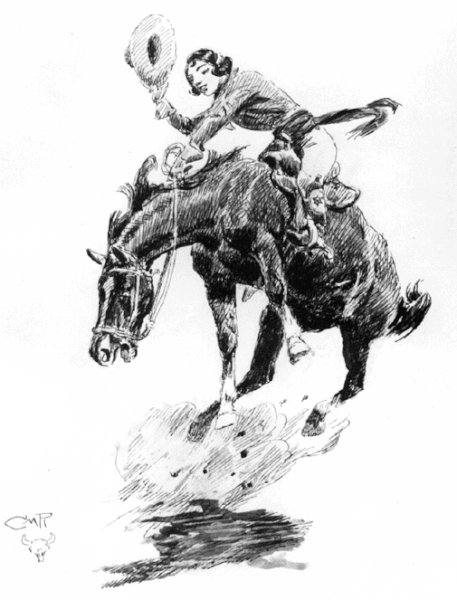
Image: C. M.Russell, public domain
Many years ago, I woke up in the middle of the night to discover that I was having sex. After a happy and sweaty evening together, the woman in question and I had fallen asleep next to one another. Some time later, she apparently had a hankering for seconds. Not wanting to waste time, she climbed on board. My body saw no reason to check with my brain and immediately got with the program. The first thing I knew, I was playing the role of bronco to an enthusiastic cowgirl–not that I minded a damned bit.
I mention this not just because I like reliving pleasant memories–although I do–but because of the current public “conversation” over sexual conduct by high-profile people in media, business, and the government. A good number of the allegations are about outright rape–forcible sexual assault without consent, or in the face of explicit protests. That’s always wrong, inherently despicable, and should be prosecuted and punished–or publicized and held against those who committed such acts but were able to escape consequences through power and intimidation.
But some accusations are more complicated, involving exchanges of sex for favors that are now regretted, or unwelcome advances that were rebuffed, or socially awkward behavior that’s cringe-inducing but not an actual violation of anybody’s rights…
Take my example above. Technically, I never gave consent. By some modern standards, I was raped. I would never raise such an accusation, because I was more than willing and would cackle hysterically at anybody who suggested such an interpretation (seriously, I’m capable of cackling). But that’s a possible way of framing that scenario. From her and my perspective, though, she had every reason to believe that her advances would be welcome and that some sort of implied consent was inherent in my naked, snoring post-coital (and ultimately pre-coital) presence in her bed.
Romantic and sexual interactions are complicated. That doesn’t mean we shouldn’t draw bright lines–explicit coercion is entirely beyond the pale. It should be harshly punished. That’s because the use of force to overcome somebody’s unwillingness is clear in a good many situations. But unwelcome advances? Clumsy seduction? Social cluelessness? If you can walk away, or reduce somebody to embarrassment by saying “you did not just do that,” it’s probably not coercion. And nobody knows it’s unwelcome until they try.
Does it help to contextualize things if I explain that I ended up in that woman’s bed because I was lying drunk on her sofa, she walked by, and I reached out to put my arm around her and missed. So she walked by again. Slowly. So I couldn’t screw it up.
Complicated.
On a related note, here’s found footage of an actual date, not too far in the future…




Recent Comments